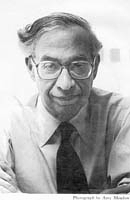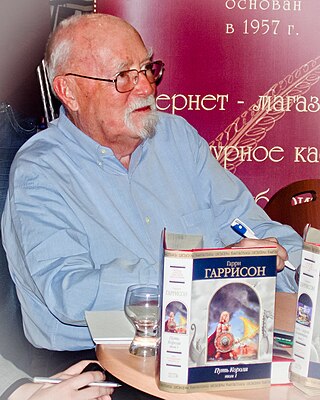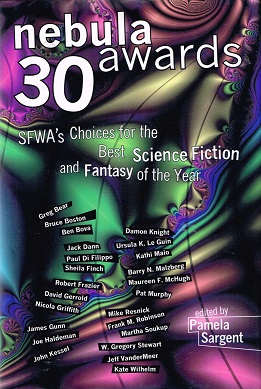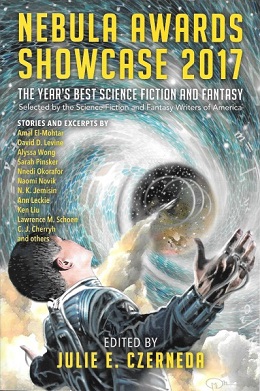Related Research Articles

Alfred Elton van Vogt was a Canadian-born American science fiction writer. His fragmented, bizarre narrative style influenced later science fiction writers, notably Philip K. Dick. He was one of the most popular and influential practitioners of science fiction in the mid-twentieth century, the genre's so-called Golden Age, and one of the most complex. The Science Fiction Writers of America named him their 14th Grand Master in 1995.

Donald Allen Wollheim was an American science fiction editor, publisher, writer, and fan. As an author, he published under his own name as well as under pseudonyms, including David Grinnell, Martin Pearson, and Darrell G. Raynor. A founding member of the Futurians, he was a leading influence on science fiction development and fandom in the 20th-century United States. Ursula K. Le Guin called Wollheim "the tough, reliable editor of Ace Books, in the Late Pulpalignean Era, 1966 and '67", which is when he published her first two novels in Ace Double editions.

James Benjamin Blish was an American science fiction and fantasy writer. He is best known for his Cities in Flight novels and his series of Star Trek novelizations written with his wife, J. A. Lawrence. His novel A Case of Conscience won the Hugo Award. He is credited with creating the term "gas giant" to refer to large planetary bodies.

Laurence van Cott Niven is an American science fiction writer. His 1970 novel Ringworld won the Hugo, Locus, Ditmar, and Nebula awards. With Jerry Pournelle he wrote The Mote in God's Eye (1974) and Lucifer's Hammer (1977). The Science Fiction and Fantasy Writers of America gave him the 2015 Damon Knight Memorial Grand Master Award.

The Science Fiction and Fantasy Writers of America, doing business as Science Fiction and Fantasy Writers Association, commonly known as SFWA is a nonprofit 501(c)(3) organization of professional science fiction and fantasy writers. While SFWA is based in the United States, its membership is open to writers worldwide. The organization was founded in 1965 by Damon Knight under the name Science Fiction Writers of America. The president of SFWA as of July 1, 2021 is Jeffe Kennedy.

Damon Francis Knight was an American science fiction author, editor, and critic. He is the author of "To Serve Man", a 1950 short story adapted for The Twilight Zone. He was married to fellow writer Kate Wilhelm.
The Clarion Workshop is an American six-week workshop for aspiring science fiction and fantasy writers. Originally an outgrowth of Damon Knight's and Kate Wilhelm's Milford Writer's Conference, held at their home in Milford, Pennsylvania, it was founded in 1968 by Robin Scott Wilson at Clarion State College in Pennsylvania. Knight and Wilhelm were among the first teachers at the workshop.

Harry Max Harrison was an American science fiction author, known mostly for his character The Stainless Steel Rat and for his novel Make Room! Make Room! (1966). The latter was the rough basis for the motion picture Soylent Green (1973). Long resident in both Ireland and the United Kingdom, Harrison was involved in the foundation of the Irish Science Fiction Association, and was, with Brian Aldiss, co-president of the Birmingham Science Fiction Group.

Judith Josephine Grossman, who took the pen-name Judith Merril around 1945, was an American and then Canadian science fiction writer, editor and political activist, and one of the first women to be widely influential in those roles.

Kate Wilhelm was an American author. She wrote novels and stories in the science fiction, mystery, and suspense genres, including the Hugo Award–winning Where Late the Sweet Birds Sang. Wilhelm established the Clarion Workshop along with her husband Damon Knight and writer Robin Scott Wilson.
"Love Is the Plan the Plan Is Death" is a short story by James Tiptree, Jr., a pen name used by American writer Alice Sheldon. It won a Nebula Award for Best Short Story in 1974. It first appeared in the anthology The Alien Condition, edited by Stephen Goldin, published by Ballantine Books in April 1973.
Orbit was a series of anthologies of new science fiction edited by Damon Knight, often featuring work by such writers as Gene Wolfe, Joanna Russ, R. A. Lafferty, and Kate Wilhelm. The anthologies tended toward the avant-garde edge of science fiction, but by no means exclusively; occasionally the volumes featured nonfiction critical writing or humorous anecdotes by Knight. Inspired by Frederik Pohl's Star Science Fiction series, and in its turn an influence on other original speculative fiction anthologies, it ran for over a decade and twenty-one volumes, not including a 1975 "Best of" collection selected from the first ten volumes.
This is a bibliography of works by Damon Knight.
The 38th World Science Fiction Convention (Worldcon), also known as Noreascon Two, was held on 29 August–1 September 1980 at the Sheraton-Boston Hotel and Hynes Civic Auditorium in Boston, Massachusetts, United States.

Turning On is a collection of thirteen science fiction short stories by American writer Damon Knight. The stories were originally published between 1951 and 1965 in Galaxy, Analog and other science fiction magazines.

Dogtales! is a themed anthology of science fiction short works edited by American writers Jack Dann and Gardner Dozois. It was first published in paperback by Ace Books in September 1988. It was reissued as an ebook by Baen Books in June 2013.

Nebula Award Stories 7 is an anthology of award-winning science fiction short works edited by Lloyd Biggle, Jr. It was first published in the United Kingdom in hardcover by Gollancz in November 1972. The first American edition was published by Harper & Row in January 1973; a Science Fiction Book Club edition, also in hardcover, followed in March of the same year. Paperback editions followed from Harrow Books in the U.S. in 1973, and Panther in the U.K. in December 1974. The American editions bore the variant title Nebula Award Stories Seven. The book has also been published in German.

Nebula Award Stories 9 is an anthology of award winning science fiction short works edited by Kate Wilhelm. It was first published in the United Kingdom in hardcover by Gollancz in November 1974. The first American edition was published by Harper & Row in January 1975. Paperback editions followed from Corgi Books in the U.K. in November 1976, and Bantam Books in the U.S. in July 1978. The American editions bore the variant title Nebula Award Stories Nine. The book has also been published in German.

Nebula Awards 30 is an anthology of science fiction short works edited by Pamela Sargent, the second of three successive volumes under her editorship. It was first published in hardcover and trade paperback by Harcourt Brace in April 1996.

Nebula Awards Showcase 2017 is an anthology of science fiction and fantasy short works edited by Canadian writer Julie E. Czerneda. It was first published in trade paperback and ebook by Pyr in May 2017.
References
- ↑ Introduction to "Baby, You Were Great", by Damon Knight, in Best Stories from Orbit, Volumes 1-10; published 1975; via Google Books
- ↑ Baby, You Were Great at Science Fiction Writers of America; retrieved January 19, 2017
- ↑ Cold War Masculinity in the Work of Kate Wilhelm, by Josh Lukin, in Daughters of Earth: Feminist Science Fiction in the Twentieth Century; edited by Justine Larbalestier; published May 22, 2006, by Wesleyan University Press; via Google Books
- ↑ Future Media, edited by Rick Wilber, reviewed by T.S. Miller; published November 14, 2011; retrieved January 19, 2017